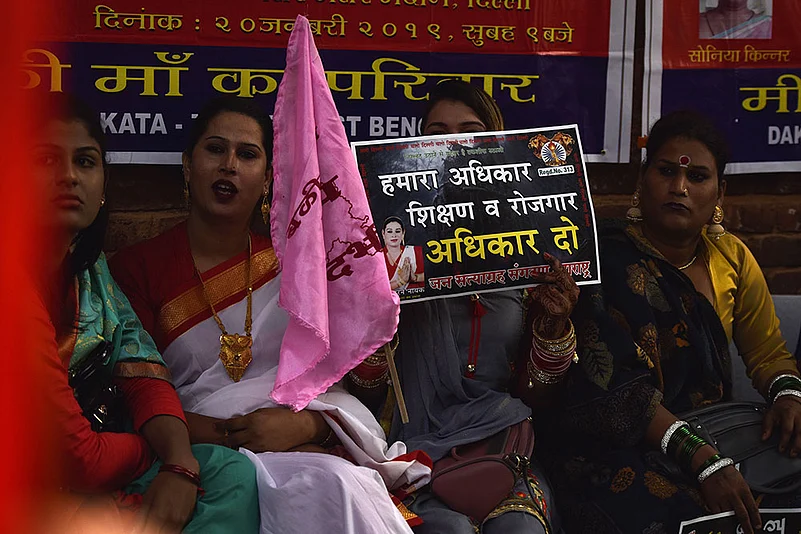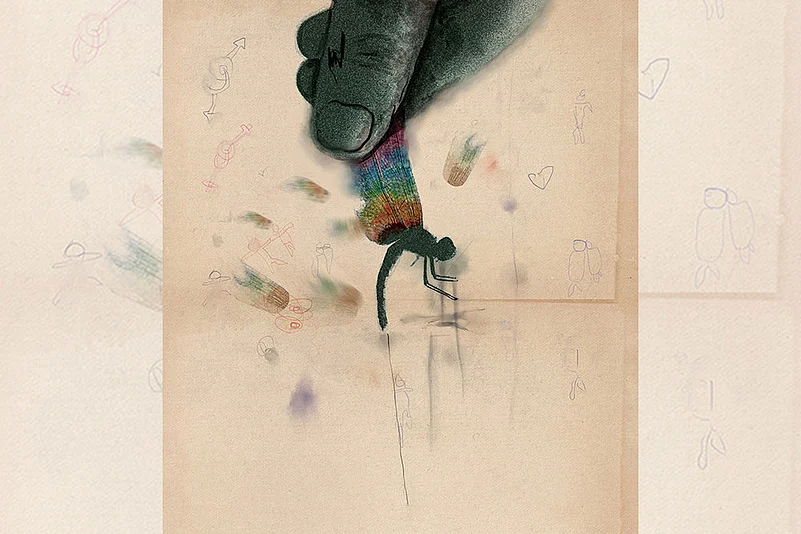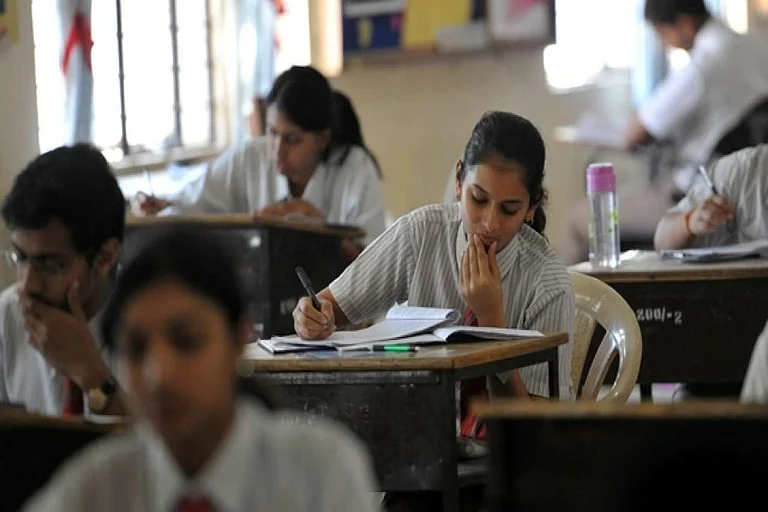It was in the middle of the Covid-19 pandemic in 2020 that Amulya Chakrabarty, then 13-years-old, came out to her parents as a transgender girl. The next two years were spent in lockdown, giving Amulya and her parents ample time to come to terms with her gender identity. Her parents emerged as powerful allies, helping her get the psychological and social support she needed. In 2022, when the schools reopened post-lockdown, Amulya and her parents got a rude shock. “I decided to come out to my school and tell them I was queer. I wanted to wear non-binary uniform and fully embrace my gender identity. I didn’t realise it would eventually get me expelled,” she states.
On the evening of June 10 this year, Amulya, who is now in the 11th standard, got a call on her private number from the cisgender male principal of her school, South Point, located in Barsapara , Guwahati. The principal asked her guardian to be put on the phone and when her mother, Indrani, answered, she was told that her daughter was “disgusting and shameful” and that they should take her out of the school immediately. Why? Amulya had posted a photo of herself in a swimming pool while wearing a swimsuit.
“Any 17-year-old would be traumatised by such words,” Indrani states, adding that the image was taken a day ago during a family outing to a resort under the supervision of her parents. “What is a kid supposed to wear in a pool if not a swimsuit?” the bewildered mother asks.
Amulya’s case is not an exception but a testament to the experience of a majority of transgender or queer students studying in Indian schools. As per data published by the NHRC regarding the state of education among LGBT+ children, a majority of trans students face bullying and harassment in school. Surveys by Gay, Lesbian, Straight Education Network found nearly 82 per cent trans students to have faced bullying about sexual orientation while 64 per cent reported that their peers, teaching staff had made them feel unsafe. Nearly 61 per cent students did not feel they could complain about any such incident without facing repercussions themselves.
Indrani, who works for a gender advocacy group for queer children, decided to complain to the State Transgender Board in Assam, headed by activist and storyteller Rituparna Neog. In response, Neog wrote to the principal of the school, seeking an explanation for the expulsion. The school responded saying the student was expelled for publicly sharing sexually explicit content. Both Indrani and Rituparna have objected to the comment.
Nearly 82 per cent trans students faced bullying about sexual orientation while 64 per cent reported that their peers, teaching staff had made them feel unsafe, as per a survey.
“What is the parameter for deciding sexually explicit content among children? How can they call a child’s photo sexually explicit? By doing so, is the principal not sexualising a child’s body? Such comments need to be scrutinised through a child protection and harassment lens,” Rituparna states.
The library educator who founded the Akam Foundation for fostering gender-inclusive education in rural Assam feels that the manner in which the school persecuted the student amounts to violation of the underage student’s integrity and right to privacy. “How did the principal acquire the student’s private number? Why call her at night? Why was he snooping on her private profile? Due to these discrepancies, I forwarded the case to the Assam State Commission for Protection of Child Rights (ASCPCR) and I am hoping they will take the right action,” she says.
The case has also been forwarded to the National Commission for Protection of Child Rights (NCPCR) which sent a notice to the school.
This, however, is not the first time that Amulya has faced issues with the school. After coming out as trans in class nine, Amulya insisted on dressing in a non-binary manner in school. This led to ridicule from her peers and teachers alike. Things came to a fore when the student was yanked by her peers to a bathroom where they tried to undress her and see her genitals. The perpetrators, also minors, were let off by school authorities with only a rebuke.
“The constant verbal and physical abuse made me want to quit school. I even contemplated suicide,” Amulya recalls. To cover up the scars of self harm, Amulya’s parents, upon recommendations from her psychiatrist, decided to get her a tattoo. Indrani also used her network and influence as a member of the NGO Anaajoree to get the school to conduct a panel discussion on gender sensitivity at the school. Though the principal and a group of teachers and students did not attend, the session was somewhat successful and Amulya was allowed to continue studying in relative peace. Soon after she passed her Class 10 examination, the school’s attitude changed once more. Amulya managed to attend just three days of class in this academic year and in those three days, she was called repeatedly to the principal’s office and rebuked for the tattoo, for “showing her legs” and for her gender expression. She had not gone to school for days and her parents were contemplating contacting the school to allow her to carry on studying provisionally from home when the incident happened.
“It is nothing but transphobia. The school administration had just been looking for an excuse to remove the student from the school. Till Class 10, their hands were tied due to the Right to Education Act. Now that she is in high school, she is much easier to target,” Rituparna alleges. The student’s family has also alleged that the school authorities said they will induct the student back on conditions of her leaving the trans community, deleting her social media account and replacing her private counselor with one provided by school. “Naturally we rejected all the conditions,” Indrani says.
The school authorities have remained unavailable for comment. The issue and Amulya’s endemic abuse over the years highlights the dire need for training teachers and students in gender sensitivity, neutrality and inclusion in educational spaces.
Indrani has since penned an open letter to Assam Chief Minister Himanta Biswa Sarma, asking the government to implement gender-inclusive uniforms in schools, support children’s self-expression in attire, criminalise bullying and harassment based on gender identity and promote understanding of diversity in sex, sexuality, and gender.
In the past, however, education and child protection bodies in India have shown limited interest in gender-inclusive reform.
In 2021, NCERT came up with a teacher training manual titled ‘Inclusion of Transgender Children in School Education: Concerns and Road Map’ published by the Department of Gender Studies at NCERT. The guidelines had been designed in consultation with members of the LGBTQIA community including educators, academics, students and activists, and included strategies for making schools more gender inclusive. Some of the guidelines included creating provision of gender-neutral toilets and uniforms, sensitisation on non-teaching staff, discontinuing practices that segregate children into various school activities based on their gender, inviting members of transgender community to speak on campus, among others.
The manual was vehemently opposed by NCPCR, the apex child rights body, chaired by Priyank Kanungo, who has on several occasions been criticised for making transphobic or queerphobic comments. In a letter to NCERT, the commission highlighted that it had received a complaint against the manual. “The idea of creating and removing binaries shall deny them equal rights of children of diverse biological needs. Second, this approach will expose children to unnecessary psychological trauma due to contradictory environments at home and in school,” said its letter.
While over 56 per cent of the transgender population is literate, dropout rates also remain high. In Kerala, dropout rate among transgender children remains high at 58 per cent.
“In essence, the commission said that implementing gender neutral practices would be discriminatory against binary or straight children,” says Harish Iyer, a queer rights activist and educator.
The commission’s letter also mentioned that the manual encouraging students to about “puberty blockers and its availability for adolescents” would be an issue. Iyer argues that gender reform isn’t just about accommodating queer students in school and colleges but about actually providing education and knowledge that all students and in extension their families can use to understand the complexities of gender and identity. “While sex is everywhere in India, sex education remains taboo,” he states. “Even when it is taught, it is in hushed silos and not in conjunction with sexuality, gender and gender roles”.
Academic and transman Dr Bittu Kondaiah, Associate Professor of Biology and Psychology and Head of Department of Psychology at Ashoka University who was part of the external team of the manual’s drafting committee said that after the protests by external groups, the manual was taken down by NCERT. “The guidelines were an attempt by some people in NCERT to see if they could come up with something as a useful document for training teachers and staff. It was meant to ensure that teachers, staff in schools would be sensitive to the concerns of trans and non binary students,” he said, adding that the NCERT did not provide any reason for the removal of the manual. Since then NCERT has taken no initiatives toward gender sensitisation.
Schools are primary spaces of socialisation for children and often considered a space that provides a more accepting environment than their homes, thanks to the interventions of educators and civil society in making classrooms more gender neutral. But when it comes to transgender kids, this is reversed. “Trans students often don’t find a welcome environment in school and are subjected to bullying by peers, teachers, other parents. It is not just about neglect but actively preventing harm-cause to these students by members of the teaching fraternity,” Kondaiah rues. Moreover, he adds, there are clearly demonstrated links between the gender environment students face and their learning outcomes.
Research highlights how bullying and harassment at school can lead to severe psychological issues for queer children not just in their formative years but throughout life. A 2017 study by NHRC regarding employment of transgender persons in Delhi and Uttar Pradesh found that a majority from the community were employed informally as wedding/badhai singers and dancers. While over 56 per cent (Census 2011) of the transgender population is literate, dropout rates also remain high due to intra-institutional discrimination. In Kerala, for instance, with the highest literacy rate in India, dropout rate among transgender children remains high at 58 per cent.
While public schools tend to be more inclusive when it comes to other socio-economic stratifications like caste, class, community, gender neutrality and sensitivity remains an “elite” concept. Private schools on the other hand usually have a greater financial wherewithal to initiate and sustain gender initiatives at an individual level.

Since 2013, Tagore International, a private school in Delhi has been conducts a programme called ‘Breaking Barriers’ where students of class 9 and upwards engage in conversations about gender, identity and lived experiences. As part of the initiative, a team of students and staff is trained by gender experts and professionals who in turn conduct gender sensitivity sessions with students. The campaign hosts gender sensitisation sessions at other schools as well. “The important thing for us is to initiate the conversation and make our students and parents understand that this is an inclusive and gender positive space,” Priyanka Randhawa, project manager in charge of the school’s outreach projects, says.
However, inclusion in the true sense would involve not just advocacy but concerted structural changes across the spectrum including adopting inclusive architecture, protocols and syllabus which at present remain hetero-centric. Priyanka admits that despite being ahead of others in the gender conversation, Tagore International still does not have gender-neutral toilets. Neither do any of the schools in Delhi NCR that the campaigners visited. The Guwahati school that expelled Amulya did not have a gender neutral toilet either, despite having an openly transgender student. “It’s the next step we are working on,” Priyanka states, adding that mandatory government or education department guidelines or policies for gender sensitisation would be of great assistance to schools trying to implement more equal spaces.
Rituparna, who has worked to make colleges and universities of Assam more inclusive in the past few years, and her team have managed to get gender neutral toilets installed in three colleges of the state. She is now in consultation with other activists to design a similar teacher training curriculum for public school teachers in Assam. “The guidelines, once finalised, will be communicated at the district level once approved by the state education board,” she states.
Such efforts, mainly by civil society, gender activists, and stakeholders have gone a long way in increasing conversation about gender and LGBTQIA issues both in alternative and mainstream educational spaces. Rituparna recalls her own college days when it was impossible for her to discuss her gender identity with her teachers. “Nowadays, due to sustained advocacy and legal reforms, many cis-gender teachers and educators including seniors make efforts to participate in events, talks, seminars and programs held by LGBT academics or thinkers. They come to learn and even express their embarrassment at not having known about transgender rights, neutral biology and other aspects of gender studies,” Rituparna adds.
Most gender activists and educators nevertheless agree that there is need for a concerted effort by the central and state governments in terms of policies and mandatory guidelines for training of teachers and staff. “We are taking small steps toward progress but true emancipation will need policy-bound, government-implemented programs. There should be mandatory training for teachers, constant assessments and training of the government staff involved in education department for sensitisation,” says Iyer.
MORE FROM THIS ISSUE
Meanwhile, at Amulya’s, things are slowly returning to normal. With the support of her family, the girl has regained her mental health and at present is firm on her future course of action. “We don’t want compensation or readmission to the school,” Amulya says, adding, “We want a public apology for the harassment so that it becomes a moment of justice for the thousands of queer kids who face harassment and abuse in schools, just because they are brave enough to stand up for themselves”.
(This appeared in the print as 'Out of Syllabus')







_.jpg?auto=format%2Ccompress&fit=max&format=webp&w=768&dpr=1.0)


























